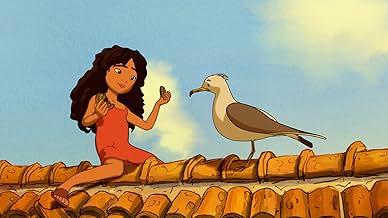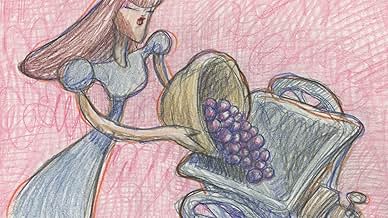L'artista e poeta in esilio Mustafa intraprende un viaggio verso casa con la sua governante e sua figlia.L'artista e poeta in esilio Mustafa intraprende un viaggio verso casa con la sua governante e sua figlia.L'artista e poeta in esilio Mustafa intraprende un viaggio verso casa con la sua governante e sua figlia.
- Premi
- 1 vittoria e 10 candidature totali
- Mustafa
- (voce)
- Kamila
- (voce)
- (as Salma Hayek Pinault)
- Almitra
- (voce)
- Halim
- (voce)
- Pasha
- (voce)
- Sergeant
- (voce)
- Baker
- (voce)
- …
- Baker
- (voce)
- …
- Grocer
- (voce)
- …
- Orange Seller
- (voce)
- …
- Woman with Shawl
- (voce)
- …
- Bride's Mother
- (voce)
- …
- Old Olive Man
- (voce)
- …
Recensioni in evidenza
I did love the section on work and did appreciate the artist being there at the screening and sharing how it was done. Also the section on love, and one or two others. I did quite enjoy how the main story was composed (and changed from the book's story) and animated.
I think though that one of the main treasures of this film is precisely the difference in animation styles of each segment, which managed to bring together the difference and multiplicity, but at the same time to cross-reference to each other and weave in the images/symbolism from other segments of the book.
So while I did not like the style and manner of some of the segments, I do appreciate them being there for the purpose of incorporating difference and multitude.
I rarely go to see the film in the theatre twice, never mind at the festival prices, but I'm going to see it again within a week from the first time - to enjoy those parts that I did like, and also to pick up on the things I might have missed the first time around.
Unlike the previous reviewer, I actually do believe it will be quite popular in North America once it comes out, if not for any other reason, then because many people could find a favorite section or two in it, even if they don't like the rest of it, it is sort of like a treasure box, which you could open to enjoy those couple pieces meaningful to you at that particular time.
One reason we don't see a lot of collective works set to one film is that a lot of people come to a movie to escape into one long story. That's not to say that there are people that like a set of short stories, but it's been proved by the studio system that a mainstream audience wants to see safer content. While you might find short film series' in a film festival, The Prophet is a collected work of artistic expression.
In a village within an unnamed middle eastern country, young speechless Almitra (played by Quvenzhané Wallis) is considered a trouble maker by her village as she is a compulsive thief and can make bird noises that allow her to communicate with seagulls. Her mother Kamila (played by Salma Hayek) tries to keep her under control now that she is a single mother (the fathers death is said to be the cause of Almitra loosing her speech) and working at a political prison. Finding school uninteresting, Almitra follows her mother to work and finds someone special behind a gate.
She finds an older but kind man Mustafa (played by Liam Neeson) who is an artist and a writer who has spent seven years under political arrest for writing controversial content that detest's the government. Mustafa and Almitra bond as the latter expresses his thoughts on life, love and freedom, as shown by segmented shorts that are usually just artsy expression of his essays. Two guardsmen (played by Alfred Molina and john Krasinski) are responsible for taking him to a ship that can return the artist to his home country, but the people may not be ready for him to leave.
Part of me really wanted to love The Prophet as it's rare to see a hand drawn animated movie and it really has passion for the essays as written by Lebenon artist Kahlil Gibran. The shorts are well done and look beautiful. It almost felt like that I was watching Fantasia again. But there's a problem; the movie tries to put them into a narrative.
I have nothing against this idea, but the movie's perspective is through the child and not the artist. This means that the story is simple and has been created as an attempt to be family entertainment. The content is tame, but I would think that most kids would find much of the artistic expression really boring.
What's weird is that I have nothing wrong with the actual story of a girl bonding with the artist and a village coming together as one. The voice acting is great and the animation looks nice. When the main narrative and the shorts are separated, their both magnificent. But when put together, it's tone is inconsistent, never finding a ground that can attract both children and adults.
Given I'm conflicted, I'll give this four collected works of Kahlil Gibran out of five purely on an artistic level. As inconsistent as the setting is, I still recommend the movie simple for it's animation. I'd say only see this if you really want to see another rare hand drawn movie.
While the book has no story or characters, someone decided to try and turn it into a movie. The basic premise is a young, mute girl and her mother meet an imprisoned philosopher the state is afraid of and travel a little with him. Along the way, he muses on subjects like love and food and death.
The framing story, done by the folks behind is very engaging, with likable characters and a simple but appealing story. The problem is the musings, each a Gibran poems animated by a different animator and either read by Liam Neeson (perfect voice for it) or turned into a pop song.
I hated most of these. The animation is rarely interesting enough to stand on its own, and because there are tons of pauses to let the animation breath, Gibran's words are unfocussed and lack their melodic rhythms. Also the songs are pretty dreadful.
The end result is an hour of entertaining drama broken up by tedious little animation of poems that stand better on their own.
Some people seem to have really enjoyed this, but I can't recommend it. Or at least, not unless you fast forward through all the poetry.
The story revolves around Mustafa, an artist and poet who was exiled seven years earlier when his words were deemed harmful to the local regime. Mustafa is informed that he will be granted his freedom to return home, and as he is escorted through town, Mustafa periodically delivers his insightful and inspiring words to the people of the land. These make up the 9 segments (Freedom, Children, Marriage, Work, Love, etc) within the movie, and each of these segments is the unique work of a different renowned artist/director. The artistic style and presentation varies between each segment, and some employ the use of music (Damien Rice, Glen Hansard).
As Mustafa recites the words of Gibran, the individual segments unfold with the artistry of each director. These blend well with the overall story which also features Mustafa's housekeeper and her young daughter (who initially doesn't speak). The voice acting is top notch thanks to Liam Neeson (Mustafa), Salma Hayek (the housekeeper), Quvenzhane Wallis (Almitra), John Krasinski (a lovesick guard), Alfred Molina (Sergeant), and Frank Langella (regime leader). Mr. Neeson is especially effective as the soothing voice of Gibran's words.
This was evidently a pet project of Salma Hayek, who also is Producer of the film. She wisely enlisted director Roger Allers, who has ties to Disney and the hugely popular The Lion King. The film is Disney-esque in its approach, but is certainly not aimed at kids. It's really a blend of the segmented structure of Fantasia, the adult-themed style of Watership Down, and the philosophical meanderings of Gandhi.
Gibran writes that "all work is noble", and the work of these filmmakers certainly is. As with any poetry or philosophy, one must be receptive to the message and willing to be inspired. If not, it's merely "love and flowers".
Lo sapevi?
- QuizSalma Hayek promoted this film on her visit to Lebanon, the birth place of Gibran Kahlil Gibran. Hayek is also of Lebanese descent.
- Citazioni
Mustafa: I have seen people throw themselves down and worship their own freedom, like slaves before a tyrant. Praising him though he slays them. I have seen the freest among them wear their freedom as a handcuff, and my heart bled within me. For you can only be free when you no longer speak of freedom as a goal. And how can you be free, unless you break the chains you have fastened around yourself? In truth, that which you call freedom is the strongest of these chains, though its links glitter in the sun.
Mustafa: And to become free, what would you remove that is not a part of yourself? If it's a tyrant, his throne was built within you. If it's a care you would cast off, that care has been chosen by you. And if it's a fear you would drive away, the root of that fear is in your heart, and not in the hand of the feared.
Mustafa: These things move within you, as lights and shadows in constant half-embrace. You'll be free indeed, not when your days are without a care, nor you nights without grief, but rather when these things bind up your life, and yet you rise above them, unbound.
I più visti
- How long is Kahlil Gibran's The Prophet?Powered by Alexa
Dettagli
- Data di uscita
- Paesi di origine
- Sito ufficiale
- Lingua
- Celebre anche come
- Kahlil Gibran's The Prophet
- Aziende produttrici
- Vedi altri crediti dell’azienda su IMDbPro
Botteghino
- Budget
- 12.000.000 USD (previsto)
- Lordo Stati Uniti e Canada
- 725.489 USD
- Fine settimana di apertura Stati Uniti e Canada
- 27.435 USD
- 9 ago 2015
- Lordo in tutto il mondo
- 1.261.412 USD
- Tempo di esecuzione1 ora 25 minuti
- Colore
- Mix di suoni
- Proporzioni
- 1.85 : 1
Contribuisci a questa pagina



































